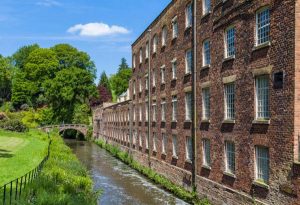Welcome to the little mill. A website devoted to mills in the UK.
Mills are fascinating. They have played a very central role in rural UK and many mills have been the hearth of the surrounding farmland. The economic importance of mills can not be understated. They allowed the area to refine their wheat in to flour, their wood into lumber and much, much more. The construction of a mill could help improve the standard of living in an area dramatically and to live in an area without a mill made life a lot harder than life was in an area with a mill.
More than just flour
 A lot of people think about wheat and flour when they hear the word mill. This is easy to understand since one of the meanings of the word mill is to grind and it is true that mills that converted wheat and other types of corn into flour have played an important historical role. But this was far from the only type of mill. Far from the only thing a mill could do.
A lot of people think about wheat and flour when they hear the word mill. This is easy to understand since one of the meanings of the word mill is to grind and it is true that mills that converted wheat and other types of corn into flour have played an important historical role. But this was far from the only type of mill. Far from the only thing a mill could do.
Mills were factories and they could do a lot of things. Mills where used to produce paper, lumber, metal objects and a lot of other things. Mills are simply automated production facilities that use the energy from water, wind, tidal movements or other sources to help make productions more effective.
Lets look at water mills. They used the awesome force of creeks and rivers to power their production. This energy could be used to mill, but it could also be used to hammer to make it easier to smith metal objects or to power a saw blade to cut wood into lumber.
Mills allowed for automated production before we learned how to use oil, gas and electricity to power or factories. Mills are a very easy and elegant solution to harness the power of water and wind to improve the life of people.
Ancient history
Humans have used mills to help them with heavy tasks for a very long time. There are plenty of example of ancient mills and we know that mills were used in the centuries before the birth of Christ. The first know water mills in continental Europe is believed to have been built in the first century AD. The technology was brought their by the Romans. Little is known about when the first mills where built in the UK. There is no firm evidence of early mills but roman aqueducts suggest that there are ancient mills still waiting to be discovered any many historians believe that the first UK mills where constructed in the 1st century AD. The oldest remaining UK mills where built a lot later then this.
Visiting mills

Visiting mills around the UK can give you a good insight into how life and industry looked at the time the mill was active. Many mills are remarkable well preserved and is well worth a visit. It is easy to think that an older mill is more interesting to visit but this is not always the case. The fact is that the opposite can often be true. By visiting a more modern mill it is easier to connect to and understand the technology used in the mill. The mills also tends to be in more original condition. Masson mill is a good example of a more modern mill that is well worth a visit. Older mills can be so far removed from our modern technology that it is hard to understand and connect to how life might have been in the mill when it was still operating. Personally I visit every mill I get the chance to visit. I understand that this might not be every ones idea of a fun time but i still recommend that you try visiting a few mills. I recommend that you start with watermills since they usually are located in very beautiful areas that are easy to enjoy even if you do not like the mill itself. Stretton watermill and Quarry bank mill are two good examples of this.
